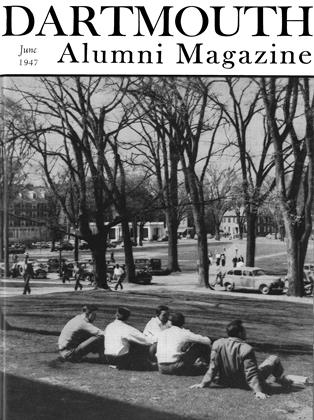IT is DESIRABLE perhaps to have some mention of incoming students in an Undergraduate Issue, but the compelling reason for writing this short editorial is the experience that the Admissions Office has just gone through in selecting next fall's freshman class. For the 650 places set aside for new men next fall, Dartmouth has had a grand total of more than 5,800 applications, including several hundred from men endeavoring to transfer from other colleges. This has produced an inevitable ratio of rejections to acceptances of about eight to one, with all its attendant disappointment, misunderstanding, and downright heartbreak in some cases.
The need for understanding die magnitude of the problem is great, especially on the part of the alumni, who in their home communities can do more than any other Dartmouth spokesmen to ease what is a serious public relations problem. The unprecedented flood of applications is expected to continue unabated for the next few years; and with Dartmouth's total enrollment definitely limited by Trustee directive and the size of each entering class not likely to go much beyond the size of next fall's class, the unhappy prospect for the College is a prolongation of the complex, almost overwhelming, situation that has prevailed this year.
Dartmouth's Selective Process of Admission has not changed in any essential detail, the Director of Admissions assured the class and club officers who recently met in Hanover. But Dartmouth's admissions standards are competitive standards, depending upon the number and caliber of the applicants for any given year. For next fall's class the competition has been the stiffest in the history of the Selective Process, and many good candidates who in normal circumstances would have gained admission have had to be turned down in favor of men offering what was judged to be better all-around qualifications. With doubled application lists, made up of hundreds of men having a desirable balance of scholastic ability and breadth of interests, the competition will remain high and so will the ratio of rejections to acceptances. However, if Dartmouth is to acquire the best possible student body and is to fulfill its fundamental educational purpose, the "going competition" each year must be met by all applicants for admission, including the sons of alumni.
This editorial has attempted to do nothing more than acquaint Dartmouth alumni with the magnitude of the admissions problem today. In the face of it, those entrusted with the admissions responsibilities are working long hours and doing an admirable job. To us it seems wholly desirable that the alumni have a full and authoritative statement about the general admissions situation, and we hope to present one by Mr. Dickerson, the director of admissions, in an early issue. Meanwhile, through Dartmouth's inability to admit anywhere near the number of men who would like to enter, there exists the basis for misunderstanding and resentment that the official College and the alumni must do their best to minimize.
 View Full Issue
View Full Issue
More From This Issue
-
 Article
ArticleA RIVER CAMPUS?
June 1947 By PETER E. COSTICH '47 -
 Class Notes
Class Notes1919
June 1947 By J. K. HUNTINGTON, MAX A. NORTON -
 Class Notes
Class Notes1918
June 1947 By ERNEST H. EARLEY, DONALD L. BARR -
 Class Notes
Class Notes1921
June 1947 By DONALD C. MIX, ROBERT M. MACDONALD -
 Article
ArticleTHE TIRED VETERAN
June 1947 By EDWARD F. EUBANKS '44 -
 Class Notes
Class Notes1943
June 1947 By FRED F. STOCKWELL, WILLIAM T. MAECK
C. E. W.
Article
-
 Article
ArticleANNUAL MEETING OF THE DARTMOUTH SECRETARIES ASSOCIATION, FEBRUARY 27 and 28, 1920
April 1920 -
 Article
ArticleHeads Boston Bank
January 1948 -
 Article
ArticleHanover Alumni Seminar
MARCH 1969 -
 Article
ArticleGive a Rouse for
June 1981 -
 Article
ArticleTHE DRESDEN PRESS*
May 1920 By Harold Goddard Rugg -
 Article
ArticleTHE FACULTY
November 1959 By HAROLD L. BOND '42







